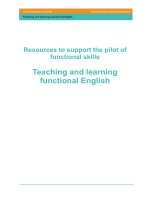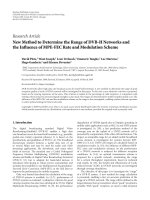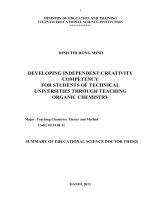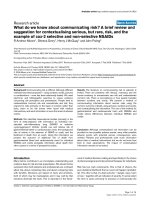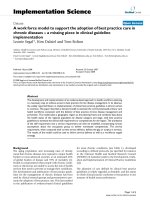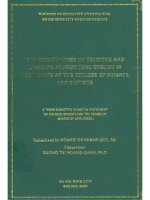Resources to support the pilot of functional skills Teaching and learning functional English pot
Bạn đang xem bản rút gọn của tài liệu. Xem và tải ngay bản đầy đủ của tài liệu tại đây (753.69 KB, 136 trang )
14-19 education and skills functional skills support programme
Teaching and learning functional English
Resources to support the pilot of
functional skills
Teaching and learning
functional English
14-19 education and skills functional skills support programme
© Crown copyright 2007
Page 2 of 136
Teaching and learning functional English
14-19 education and skills functional skills support programme
© Crown copyright 2007
Page 3 of 136
Teaching and learning functional English
Contents
General introduction 5
Teaching and learning functional English
Overview 19
1. Introduction 21
1.1 What is functional English? 21
1.2 The functional English vision 21
1.3 Teaching functional English 22
1.4 How to read the standards 23
1.5 Progression through the levels 25
2. Speaking and listening 27
2.1 Introduction 28
2.2 Starting points 30
2.3 Awareness of audience 33
2.4 Speaking 37
2.5 Discussions 42
2.6 Listening 49
2.7 Non-verbal communication 53
2.8 Presentations 57
3. Reading 65
3.1 Introduction 66
3.2 Choosing functional reading material 68
3.3 Improving reading skills 74
3.4 Applying reading skills 83
4. Writing 91
4.1 Introduction 92
4.2 Audience and purpose 96
4.3 Types of document 99
4.4 Checking written work 111
4.5 Improving writing skills 114
5. References and resources 123
Acronyms 132
14-19 education and skills functional skills support programme
© Crown copyright 2007
Page 4 of 136
Teaching and learning functional English
14-19 education and skills functional skills support programme
© Crown copyright 2007
Page 5 of 136
Teaching and learning functional English: General introduction
General introduction
Preface
This resource has been prepared by the functional skills support programme for
use in the 1000 centres that will be piloting functional skills from September
2007. These include schools, colleges, training providers, work-based learning,
adult and community learning, and secure contexts. Functional skills will be
piloted at all levels from Entry level to Level 2, and to learners aged from 14
upwards, including links with GCSE in the relevant subjects.
This resource is in four parts:
1. Managing delivery
2. Teaching and learning functional English
3. Teaching and learning functional mathematics
4. Teaching and learning functional Information and Communication
Technology (ICT).
The aim is to offer support that will enable the reader to move forward with the
implementation of the pilot for functional skills. It is expected that most specialist
teaching staff (English, mathematics, ICT) and leaders/managers in the pilot
centres will have had the opportunity to attend the CPD sessions organised by
the functional skills support programme in June and July 2007, with follow-up
sessions in October 2007 and February 2008.
Clearly, different practitioners, coming from different backgrounds, have very
different areas of familiarity, interest and concern in relation to functional skills.
An important aim of this material is to encourage common levels of
understanding, so that teachers and leaders/managers coming from school,
college, training provider, prison education and so on can develop a shared
understanding, vocabulary and approach to functional skills that, while fit for
each setting, have a common core.
It is important to understand two key points.
• This pilot is genuinely developmental, ie it is not expected that the pilot
centres will ‘get it right first time’. Rather, supported by the functional
skills support programme, by the awarding bodies, and by these and
subsequent materials and resources, they will develop good practice and
share experience during the three years of the pilot. This will inform the
national roll-out of functional skills in 2010.
• These materials are about management, and about teaching and
learning. It is not their role to give guidance on preparing learners for
summative assessment, in whatever form or forms this will be piloted.
14-19 education and skills functional skills support programme
© Crown copyright 2007
Page 6 of 136
Teaching and learning functional English: General introduction
The functional skills support programme
Support for centres in the pilot will be available from the functional skills
support programme, which is managed by the Quality Improvement Agency
(QIA) and by the Secondary National Strategy (SNS), and from the awarding
bodies.
QIA has contracted the Learning and Skills Network (LSN) to develop a
range of support materials. See www.LSNeducation.org.uk/functionalskills
SNS will deliver support for workforce development. Initially, this support will
be focused on those centres taking part in the functional skills pilots from
September 2007. See www.standards.dfes.gov.uk
Other sources of information and support
DfES 14-19 website at www.dfes.gov.uk/14-19 Go to ‘Qualifications’ and
then ‘Getting the basics right: Functional skills’.
The QCA website at www.qca.org.uk/qca_6062.aspx has information about
the functional skills standards and the pilot.
The Key Skills Support Programme has a continuing brief to provide centres
with information about functional skills developments. See
www.keyskillssupport.net
Many of the awarding bodies’ websites have sections dedicated to functional
skills.
14-19 education and skills functional skills support programme
© Crown copyright 2007
Page 7 of 136
Teaching and learning functional English: General introduction
Introduction
What are functional skills?
The DfES defined functional skills as:
‘the core elements of English, mathematics and ICT that provide an
individual with the essential knowledge, skills, and understanding that will
enable them to operate confidently effectively and independently in life and
at work.’
14-19 Education and Skills: Implementation Plan (DfES, 2005a)
The origins of functional skills lie in the Tomlinson report on 14-19 reform
(DfES, 2004) and in the government’s response in the White Paper 14-19
Education and Skills (DfES, 2005b). Tomlinson argued that it was possible for
young people to achieve grade C and above in GCSE English and mathematics
without having a satisfactory standard of literacy or numeracy. In the White
Paper, the government promised a ‘sharper focus on the basics’ and to ensure
that learners have a sound grounding in ‘functional skills’.
Functional skills qualifications are therefore being developed in English,
mathematics and ICT. The intention is that, in due course, functional skills
qualifications will provide a single ladder of achievement from Entry to Level 3
that is available to all learners aged 14+ in all sectors.
A problem solving approach
A key characteristic of functional skills is that they are based on a problem
solving approach. Learners who are ‘functionally skilled’ are able to use and
apply the English/mathematics/ICT they know to tackle problems that arise in
their life and work.
Clearly, teachers cannot know what English/mathematics/ICT their learners will
use as they move through their lives. This means that we cannot identify a
curriculum core that every learner will use. Instead, and much more powerfully,
learners should be taught to use and apply the English/mathematics/ICT that
they know, and to ask for help with the areas with which they are less confident.
It is essential to think of learners becoming functional in their English/
mathematics/ICT, rather than thinking that there is a vital body of knowledge,
known as functional English/mathematics/ICT.
The implications for teaching and learning are significant and will need to be
introduced gradually and thoughtfully, but they do not threaten aspects of
existing good practice. Helping learners to become more ‘functional’ is
supported by existing practices including:
• learning through application
• learner-centred approaches
14-19 education and skills functional skills support programme
© Crown copyright 2007
Page 8 of 136
Teaching and learning functional English: General introduction
• active learning and a problem-centred approach
• partnership learning
• assessment for learning.
Why are functional skills needed?
‘Employers and educators have identified these skills as vital for enabling
young people and adults to have the practical skills to succeed in further
learning, employment and life in modern society.’
‘Functional’ skills – Your questions answered (DfES, 2006a)
The introduction of functional skills, both into the 14-19 curriculum and for adult
learners, is being driven by a number of social, educational and economic
concerns. For example:
• Only 45% of school leavers achieve five A*-C GCSEs including English
and mathematics.
The ‘need to give every child a good command of English and maths’ is
seen ‘as the way to overcome economic and social disadvantage and
make equality of opportunity a reality’ for every child.
Higher Standards, Better Schools for All (DfES, 2005c)
• Without functional skills, pupils would find it ‘almost impossible to
succeed’ because of the difficulty they would have in accessing the
secondary curriculum.
2020 Vision (the ‘Gilbert Review’) (DfES, 2006b)
• Basic skill levels of those leaving school and seeking employment are
inadequate.
Working on the Three Rs (CBI, 2006)
• Functional skills are central to achieving the outcomes of ‘Every Child
Matters’ (DfES, 2003), particularly:
enjoy and achieve
make a positive contribution
achieve economic well-being.
Functional skills for employability – the skills agenda
For the UK to remain economically competitive, the knowledge and skills base
of the population must increase. Low post-16 participation rates mean that
learners are not staying in learning to achieve the Level 2 (GCSE A*-C)
benchmark that will lead them into employability.
14-19 education and skills functional skills support programme
© Crown copyright 2007
Page 9 of 136
Teaching and learning functional English: General introduction
A series of government publications and policies, particularly in the last five
years, has emphasised the importance of these skills for employability and set
what has become known as ‘the skills agenda’. The ‘Leitch Report’ (2006) said:
‘In the 21st century, our natural resource is our people – and their
potential is both untapped and vast. Skills will unlock that potential. The
prize for our country will be enormous – higher productivity, the creation
of wealth and social justice.’
Leitch identified the following skills as ‘applicable in most jobs’:
• literacy
• numeracy
• team working
• communication
and set targets to close the ‘skills gap’ by 2020, including:
• 95% of adults to achieve functional literacy and numeracy (three times
the current projected rate of improvement – 7.4 million adult attainments)
• more than 90% of adults to be qualified at least to Level 2 – 5.7 million
adult attainments
• 4 million adult Level 3 attainments
• half a million apprenticeships a year
• 40% of adults to be qualified to Level 4 and above.
Leitch was very clear that, while the focus of his report was on the skills of
adults aged between 19 and 65, these targets will not be achieved unless they
are underpinned by 14-19 education and training:
‘… the Review also recognises how vital effective education for young
people is to the new ambition. School standards have improved over the
past decade, with more young people than ever achieving five good GCSEs.
And yet, more than one in six young people leave school unable to read,
write and add up properly. The proportion of young people staying in
education past 16 is below the OECD average. The Review emphasises
how critical reforms to GCSEs are to improve functional literacy and
numeracy. The new 14-19 Diplomas must succeed.’
The development of functional skills in schools and colleges will make a major
contribution to meeting these targets.
World Class Skills: Implementing the Leitch Review of Skills in England was
published in July 2007. It presents the Government’s response to the Leitch
Review.
The same message comes from the Confederation of British Industry (CBI):
‘Weak functional skills are associated with higher unemployment, lower
earnings, poorer chances of career progression and social exclusion…The
time has come to ensure that school-leavers in future have the functional
14-19 education and skills functional skills support programme
© Crown copyright 2007
Page 10 of 136
Teaching and learning functional English: General introduction
skills they need for work and daily life. In short, British business sees
concerted action on functional skills as a key priority.’
Working on the Three Rs (CBI, 2006)
This is not simply a matter of young people not being ‘good at maths’ or ‘not
being able to spell and punctuate’. While some may have these weaknesses,
the real problem is that even those who can demonstrate the knowledge and
understanding required by GCSE do not know how to use and apply their
knowledge in practical work-based contexts; this is a problem of skills rather
than of knowledge. As explained above, functional skills are not only about
knowledge – they are about the use and application of English, mathematics
and ICT in real contexts.
Functional skills in higher education
English, mathematics and ICT skills, and the ability to apply them in contexts,
are critical to successful progression in education and training post-19. In recent
years, many higher education institutions (HEIs) have highlighted the lack of
these skills among school leavers. They have shown how weaknesses in these
skills have a negative impact on retention and achievement in degree level
courses. As a result, many HEIs have to provide remedial courses in these
subjects, even to undergraduates who have good grades at GCSE. As with
young people entering employment, this is not simply a matter of
undergraduates being weak in English, maths and/or ICT. The problem is that
even those who have achieved good grades at GCSE do not know how to use
and apply their knowledge in practical contexts, whether these are in the
humanities, the sciences, engineering, business, or the plethora of vocational
degrees that are now available. Functional skills are designed to develop these
applied skills.
Functional skills in everyday life
Official and unofficial reports dating back to the 19th century have identified
poor standards of literacy and numeracy as a problem affecting not only the
employability of individuals and the impact on the economy, but also the quality
of people’s lives in the broadest sense. Recent research from the National
Research and Development Centre (NRDC), for example, has confirmed that
people with poor levels of literacy and numeracy have poorer physical and
mental health, live in lower standard accommodation, have higher rates of
family breakdown, are more politically apathetic, are more likely to have been in
trouble with the police, and have lower self-esteem. In recent years, the ability
to cope with ICT, even at a very basic level, has become necessary for people
to operate effectively in everyday life.
Functional skills are therefore:
• central to the success of the reforms in 14-19 education and training and
to the ‘skills agenda’
• crucial for the personal development of all learners aged 14 and above
• needed for degree level study
14-19 education and skills functional skills support programme
© Crown copyright 2007
Page 11 of 136
Teaching and learning functional English: General introduction
• a platform for the development of employability skills
• fundamental to tackling the skills gap in England.
How are functional skills being developed?
The standards
QCA has developed draft standards for functional English, mathematics and
ICT at Entry levels 1, 2 and 3, Level 1 and Level 2 (QCA June 2007). Figure 1
shows how these levels relate to the National Qualifications Framework.
Figure 1
Functional
skills levels
National
Qualifications
Framework
levels
Examples of qualifications at each
level
Entry 1
Entry 2
Entry 3
Entry Adult Literacy and Numeracy
certificates
Level 1 1 GCSEs grades D-G
Level 1 Key Skills
Level 1 Certificates in Adult Literacy
and Numeracy
Level 1 NVQ
Level 2 2 GCSEs grades A*-C
Level 2 Key Skills
Level 2 Certificates in Adult Literacy
and Numeracy
Level 2 NVQ
BTEC First
Level 3
(NB standards
not yet
drafted)
3 AS and A levels
Level 3 Key Skills
Level 3 NVQ
BTEC National
It is important to recognise that the ‘levelness’ of a functional skill is determined
by a combination of factors:
• the complexity of the situation or problem the learner is tackling
• the familiarity to the learner of the situation or problem
• the technical demand of the skill required
• the independence of the learner in identifying and selecting the skills they
will need, and in tackling the situation or problem.
14-19 education and skills functional skills support programme
© Crown copyright 2007
Page 12 of 136
Teaching and learning functional English: General introduction
A learner who is ‘functional’ in mathematics, English and/or ICT is able to
consider a problem or task, identify the functional mathematics, English and/or
ICT skills that will help them to tackle it, select from the range of skills in which
they are competent (or know what help they need and who to ask), and apply
them appropriately. This interplay of the four factors means, for example, that
tackling a complex problem in a situation with which a learner is unfamiliar but
that requires relatively undemanding English/mathematics/ICT skills may
involve a higher level of ‘functionality’ than a relatively straightforward task in a
familiar context that requires more advanced ‘subject’ skills. It is the
combination of the four factors that confirms the functional skill level.
Following extensive consultation in 2005/06, small-scale trials of the draft
standards were carried out in 2006/07. The resulting revised standards are
being piloted by the awarding bodies from autumn 2007.
The focus of the draft standards is on:
• the application of transferable, practical skills underpinned by knowledge
and understanding
• enhancing current GCSE provision
• offering a single ladder of achievement and progression with each level
incorporating and building on the level/s below.
The draft standards:
• set out the expected knowledge, understanding and skills as well as their
scope and level of demand
• are not detailed curricula or schemes of work
• do not set out models of assessment.
Details of how to ‘read’ the standards in each functional skill subject are
included in the appropriate part of this publication.
Standards are, of course, only the first stage in developing qualifications. When
they are finalised, QCA works with the awarding bodies to develop the
assessment methods and the qualifications.
Assessment
The assessment regime for functional skills will influence:
• models of delivery
• approaches to teaching and learning
• learner motivation and engagement
• continuing professional development (CPD).
The assessment methods for functional skills qualifications must be fit for
purpose across a wide range of learners in a wide range of contexts. It may be
that no one method will be appropriate to all settings.
14-19 education and skills functional skills support programme
© Crown copyright 2007
Page 13 of 136
Teaching and learning functional English: General introduction
During the pilot, 12 awarding bodies will pilot a range of models of assessment.
QCA has produced three documents, one for each functional skills subject,
entitled ‘Assessment arrangements and principles for pilot’. These documents
define the parameters within which the awarding bodies will develop
assessment models and materials for functional skills qualifications during the
pilot. These models and materials will be accredited by QCA. Many of the
principles are common to all three functional skills, including:
• the assessment can be entirely task-based, or a combination of tasks
with test-style items
• the assessment should not be entirely test-based
• assessment items may be externally set by an awarding body or
requirements may be externally set and provide for internally
contextualised task-based assessments
• assessment is of the candidate’s own ability to solve a problem or reach
an outcome by independent application of skills.
For details of assessment, you should contact your awarding body.
The pilot
What has been learned from the trials of the standards and the approaches to
assessment will inform the certificated pilots that run for three years from
September 2007 (ie, candidates in these pilots can be awarded a functional
skills certificate). These will involve approximately 1000 centres, most of whom
will be schools but also including colleges, training providers, work-based
provision, adult and community settings and secure settings.
From 2008, functional skills will be piloted within the first phase of Diplomas.
Some 800 of the pilot centres are also piloting the Diploma (having passed
through the ‘Gateway’). They will therefore pilot all three functional skills. The
other centres have been identified by QCA and the awarding bodies and may
pilot one, two or all three functional skills.
Timelines
Start date
September
2007
Three-year pilot (approximately 1000 centres) of functional
English, mathematics and ICT in a range of contexts, including
stand-alone.
September
2008
All three functional skills trialled within the first tranche of
Diplomas (construction and the built environment, creative and
media, engineering, society health and development, IT).
September
2010
Functional English, mathematics and ICT available nationally.
14-19 education and skills functional skills support programme
© Crown copyright 2007
Page 14 of 136
Teaching and learning functional English: General introduction
Where do functional skills fit in the 14-19 reform programme?
Functional skills are at the core of the 14-19 reform programme.
The key features of the reform programme are:
• a strengthened core – functional skills
• the Foundation Learning Tier
• revised GCSEs (from 2010)
• revised AS and A levels (from 2008)
• new Diplomas (from 2008)
• age 16 no longer a fixed point
• a new ‘extended project’ qualification at Level 3
• personalisation of learning.
‘… passing these functional skills qualifications will be a requirement for
achieving a C or better in GCSE English, maths or ICT. Young people will
therefore have to master the functional skills in order to achieve a… Diploma or
an apprenticeship.’
White Paper 14-19 Education and Skills (DfES, 2005)
In effect, therefore, achievement of functional skills will be a requirement for all
14-19 learners.
Key Stage 3
Level 1 functional skills will be embedded in the programmes of study for
English, mathematics and ICT at Key Stage 3.
Clearly, success at 14-19, and hence the success of the reforms as a whole,
depends on establishing firm foundations at Key Stage 3. Hence, the emphasis
on functional skills starts with reform of the Key Stage 3 curriculum and
programmes of study.
QCA is currently reviewing what pupils learn at Key Stage 3 by revising the
national curriculum programmes of study in order to provide:
• greater flexibility
• improved coherence
• increased personalisation.
One of the aims of the revised curriculum is to develop successful learners who
possess ‘the essential learning skills of literacy, numeracy and information and
communication technology’.
‘Individuals at any age who possess these skills will be able to participate
and progress in education, training and employment as well as develop
and secure the broader range of aptitudes, attitudes and behaviours that
14-19 education and skills functional skills support programme
© Crown copyright 2007
Page 15 of 136
Teaching and learning functional English: General introduction
will enable them to make a positive contribution to the communities in
which they live and work.’
www.qca.org.uk/secondarycurriculumreview/
Key Stage 4
Level 2 functional skills will be embedded in the programmes of study for
English, mathematics and ICT at Key Stage 4.
The functional skills standards are being incorporated into the revised GCSE
criteria for English, mathematics and ICT.
While delivery of the underpinning knowledge and understanding is likely to
remain the responsibility of specialist GCSE teachers, functional skills will only
become transferable when they are embedded across the curriculum. All staff
will need to raise their awareness of the relevance of these skills and support
learners in applying them in their subject areas.
Every Child Matters (DfES, 2004) includes outcomes that require schools and
other providers to focus on employability. These skills are developed at Key
Stage 4 through work-related learning and enterprise education. Functional
English, mathematics and ICT will provide learners with a platform on which to
develop these wider employability skills.
The functional skills qualifications will therefore be:
• available as free-standing qualifications for learners aged 14 and over
• linked to the revised GCSEs in English, mathematics and ICT that will be
available nationally from 2010. To achieve a grade C or above,
candidates will have to achieve the relevant functional skill at Level 2.
During the pilot, candidates who achieve the GCSE standard but do not
reach the required level in the functional skill will still receive the GCSE
award
• a mandatory component of the new Diplomas. The Diplomas are a key
area of the reforms set out in 14-19 Education and Skills (DfES, 2005b).
They are employer-led qualifications, designed to offer young people a
motivating and relevant learning experience through a high quality
programme that combines general education with applied practical
learning.
They are intended for young people of all abilities and backgrounds and
will offer clear routes for progression, whether to further or higher
education or to skilled employment. At each stage of their learning,
learners will be able to move from the traditional routes of GCSE/A level
and vocational programmes to the Diploma, or vice versa, as well as
across Diploma lines.
14-19 education and skills functional skills support programme
© Crown copyright 2007
Page 16 of 136
Teaching and learning functional English: General introduction
The Diplomas will extend learners’ employability skills through a range of
assessed learning and development activities that include:
a focus on a particular economic sector
a mandatory functional skills component
personal learning and thinking skills (PLTS)
work experience.
The qualifications are being developed jointly by the DCSF, QCA and the
Skills for Business Network. Diploma Development Partnerships (DDPs),
who represent employers, further and higher education, schools and
awarding bodies, are responsible for developing the content.
The Diplomas are being developed in 14 lines of learning which will be
introduced in three phases between September 2008 and September
2010.
‘Generic learning’ is a mandatory component of all the Diplomas and
includes:
functional skills in English, mathematics and ICT
personal, learning and thinking skills (these link closely to the key
skills of Working with Others, Improving Own Learning and
Performance, and Problem Solving. It is expected that these key
skills qualifications will continue to be available)
work experience
a project (extended at Level 3).
Achievement of all three functional skills at the appropriate level is
therefore a requirement for gaining a Diploma:
Diploma level Functional skills level
Foundation Level 1
Higher and Advanced Level 2
The Diplomas will be delivered by collaborative local partnerships which
will involve a consortium of providers (including schools and colleges).
To ensure high quality provision, these partnerships have been required
to pass through a ‘Gateway’ process to confirm their readiness to deliver
the Diploma from 2008.
The full specifications for the first five Diplomas will be available to
centres by September 2007.
Foundation Learning Tier
The Foundation Learning Tier (FLT) is the umbrella term for all provision below
Level 2 that is taken by learners over the age of 14 (ie it includes adult
14-19 education and skills functional skills support programme
© Crown copyright 2007
Page 17 of 136
Teaching and learning functional English: General introduction
learners). It therefore encompasses what is currently categorised as pre-Entry,
Entry level (split into Entry levels 1, 2 and 3) and Level 1.
Phased implementation of the FLT began in August 2007, with an increasing
number of providers due to introduce learning programmes until a full
complement is reached in 2010.
Learning programmes in FLT will draw on three curriculum areas: personal and
social development, vocational/subject-based learning, and key and basic skills.
The functional skills, once developed, will replace the key and basic skills.
For details about the Foundation Learning Tier, see www.qca.org.uk/flt.
Apprenticeships
Although final decisions have not yet been made about the role of functional
skills in apprenticeships, the expectation is that they will replace key skills
Communication, Application of Number and ICT at Levels 1 and 2. Level 3 key
skills and the wider key skills are likely to remain in frameworks, or could be
introduced.
It is anticipated that key skills and Skills for Life will continue to be
available for registration until 2010.
14-19 education and skills functional skills support programme
© Crown copyright 2007
Page 18 of 136
Teaching and learning functional English: General introduction
References
CBI (2006) Working on the Three Rs. London: Confederation of British Industry
DfES (2003) Green Paper: Every Child Matters. London: DfES
DfES (2004) 14-19 Curriculum and Qualifications Reform: Final Report of the
Working Group on 14-19 Reform. London: DfES (The Tomlinson Report)
DfES (2005a) 14-19 Education and Skills: Implementation Plan. London: DfES
DfES (2005b) White Paper: 14-19 Education and Skills. London: HMSO
DfES (2005c) White Paper: Higher Standards, Better Schools for All. London:
DfES
DfES (2006a) ‘Functional’ skills – Your questions answered. London: DfES
DfES (2006b) 2020 Vision: Report of the teaching and learning in 2020 Review
Group. London: DfES
DIUS (2007) World Class Skills: Implementing the Leitch Review of Skills in
England. London: DIUS
Leitch, S. (2006) Prosperity for all in the global economy – world class skills:
final report. London: The Stationery Office
QCA (2007) Functional skills draft standards. www.qca.org.uk/qca_6066.aspx
14-19 education and skills functional skills support programme
© Crown copyright 2007
Page 19 of 136
Teaching and learning functional English: Overview
Teaching and learning functional
English
Overview
‘Teaching and learning functional English’ is intended to support teachers as
they prepare courses that lead to qualifications in functional English, either free-
standing or in the context of other qualifications. There are five sections.
The first section, the Introduction, sets out what functional English is, what is
expected to change as a result of the Government’s vision for functional
English, and how teachers should use the Qualifications and Curriculum
Authority (QCA) document: Functional skills standards: English.
The following three sections focus on the three components of functional
English: Speaking and listening, Reading, and Writing. Each section gives:
• an introduction to what being functional in the component means
• guidance on interpreting the levels of this component of functional
English
• guidance on how teachers can approach this aspect of functional English
in ways that learners will find realistic and engaging
• examples of a range of activities that can be adapted for use both by
specialist English teachers and by non-specialists teaching other
subjects or vocational areas.
The final section, ‘References and resources’, gives a wide range of materials
that you may find useful.
14-19 education and skills functional skills support programme
© Crown copyright 2007
Page 20 of 136
Teaching and learning functional English: Overview
14-19 education and skills functional skills support programme
© Crown copyright 2007
Page 21 of 136
Teaching and learning functional English: 1. Introduction
1. Introduction
Contents
1.1 What is functional English?
1.2 The functional English vision
1.3 Teaching functional English
1.4 How to read the standards
1.5 Progression through the levels
1.1 What is functional English?
The DfES’s generic definition of functional skills noted that functional skills will:
‘provide an individual with the essential knowledge, skills and
understanding that will enable them to operate confidently, effectively
and independently in life and at work. Individuals of whatever age who
possess these skills will be able to participate and progress in education,
training and employment as well as develop and secure the broader
range of aptitudes, attitudes and behaviours that will enable them to
make a positive contribution to the communities in which they live and
work.’
The vision described is of learners:
• developing the practical applied skills needed for success in work,
learning and life
• tackling the skills gap, improving productivity, enterprise and
competitiveness
• becoming more confident in their studies in further and higher education
• becoming more confident in interaction with people in their lives.
Functional English will contribute to this agenda. Learners who are functional in
English are able to communicate effectively in a wide range of meaningful
contexts – in life, work, learning and their communities.
1.2 The functional English vision
The introduction to Functional skills standards: English states that:
‘The term functional should be considered in the broad sense of
providing learners with the skills and abilities they need to take an active
and responsible role in their communities, in their workplace and in
educational settings. It requires learners to be able to communicate in
ways that make them effective and involved as citizens, operate
14-19 education and skills functional skills support programme
© Crown copyright 2007
Page 22 of 136
Teaching and learning functional English: 1. Introduction
confidently and convey their ideas and opinions clearly in a wide range of
contexts.
The aim of the English standards is to encourage learners to
demonstrate their speaking and listening, reading and writing skills in a
range of contexts and for various purposes. They are essentially
concerned with developing and recognising the ability of learners to
apply and transfer skills in ways that are appropriate to their situation.’
There are examples of what being functional in English may involve in a recent
Confederation of British Industry (CBI) report (Working on the three Rs, August
2006). This states that employers are looking for people who can:
• articulate clearly
• take and pass on messages
• deal with customers effectively
• read, understand and follow a wide range of documents
• write fluently and accurately, using accepted business conventions of
format, spelling, grammar and punctuation.
1.3 Teaching functional English
As a teacher, you cannot know all the specific tasks that your learners will be
faced with in their lives that will require them to use their English skills.
However, you can help them to apply their English skills to maximum effect. So,
helping learners to become functional in English means helping them to:
• choose appropriate communication methods
• ensure their communication methods are fit for purpose
• communicate in ways that meet the needs of the audience and situation
• apply English skills in a range of meaningful contexts
• become increasingly independent in their learning.
It is essential to think of learners becoming functional in their English, rather
than thinking there is a vital body of knowledge known as functional English.
This is likely to require a different approach to teaching and learning which
focuses on applied learning, using wherever possible a subject or vocational
focus. This has important implications both within English lessons and across
the curriculum.
• Within their specialist English lessons, learners will need opportunities to
apply their skills to a range of real and realistic topics, relevant to life and
work. The topics should be plainly relevant to learners, appealing to them
by being motivating, interesting and realistic. English teaching should
reveal how English is used in life, enabling learners to gain experience of
the breadth of applications of the subject.
14-19 education and skills functional skills support programme
© Crown copyright 2007
Page 23 of 136
Teaching and learning functional English: 1. Introduction
• In their wider programmes, learners will need appropriate support as they
apply the skills of functional English in their subject or vocational area.
On a GCSE programme, this might involve practising making a
presentation or writing a report in another subject. On a work-based or
work-related programme, this might include taking part in real or realistic
team meetings, or researching a range of suppliers.
This calls for collaborative working. In particular:
• specialists and non-specialists will need to work together at the planning
stage so that they are aware when each other will be tackling work
relevant to functional English
• specialists may need to brief and support non-specialists so that they can
in turn support learners as they practise and apply their English skills.
There should also be opportunities to link functional English with other
functional skills (mathematics and ICT) and with other parts of the curriculum
such as citizenship, enterprise or work-related learning.
The implications for teaching and learning the features of functional English
described above are significant, and will need to be introduced gradually and
thoughtfully but they do not threaten aspects of existing good practice. This
resource sets out some of the ways in which making adjustments to help
learners become more functional in English is supported by existing practices
including:
• learning through application
• learner-centred approaches
• active learning
• partnership learning
• assessment for learning.
In doing this you will be building on the best of key skills, Skills for Life and
GCSE teaching. This means that you may encounter approaches in this
material that you have met before. We have written the material so that you can
choose those parts that are most relevant to you.
1.4 How to read the standards
The standards for functional English are set out in a single document, published
by the Qualifications and Curriculum Authority (QCA) that covers the levels from
Entry 1 to Level 2. After a brief introduction, the document sets out the
standards in two sections. The document begins with a short introduction and
statement of the purpose of the standards. The main body of the document then
sets out the three components:
• Speaking and listening
• Reading
• Writing
14-19 education and skills functional skills support programme
© Crown copyright 2007
Page 24 of 136
Teaching and learning functional English: 1. Introduction
At the beginning of each of these components, there is a short explanatory
note. It is well worth reading these introductory sections to gain a clear vision of
the progression across the levels in general terms, before going on to look at
the specifics of the standards.
The standards themselves are laid out in grid form with:
• the level
• the skill standard – this is the crucial statement and should be the overall
focus of teaching and learning
• the coverage and range – these indicate the technical demand of the
English skills and techniques that are likely to be used by learners
performing at that level. Note that, in interpreting the coverage/range
statements, learners at a specific level should be able to do everything
expected by the lower levels as well.
A footnote states how the content corresponds to National Curriculum English,
Adult Literacy Standards and Communication key skill.
As an example, here is the Level 2 speaking and listening component from the
standards:
Level 2 (Speaking and listening)
Level Skill standard Coverage and range
Level
2*
Make a range of contributions
to discussions and make
effective presentations in a
wide range of contexts.
• listen to complex information and give a
relevant, cogent response in
appropriate language
• present information and ideas clearly
and persuasively to others
• adapt contributions in discussions to
suit audience, purpose and situation
• make significant contributions to
discussions, taking a range of roles and
helping to move discussion forward to
reach decisions
in a wide range of contexts, including those
that involve others who are unfamiliar
* The content corresponds to National Curriculum English level 6; Adult Literacy Standards and
Communication key skill, level 2
You can follow progression through from Entry levels to Level 2 in any one
component (eg reading) or alternatively, follow through the requirements for a
particular level across all three components.
14-19 education and skills functional skills support programme
© Crown copyright 2007
Page 25 of 136
Teaching and learning functional English: 1. Introduction
Note that the standards do not say how functional English will be assessed, nor
do they give examples of how it should be developed or taught. The standards
are designed to be context- and assessment-free.
1.5 Progression through the levels
Functional English standards have been issued for the first three levels of the
National Qualifications Framework – Entry level, Level 1 and Level 2. As usual,
Entry level is subdivided into Entry 1, Entry 2 and Entry 3 to reflect the
importance of small incremental steps in learning for learners at these levels.
For ease of reference, Entry 1 is comparable in demand with National
Curriculum level 1, Entry 2 with National Curriculum level 2 and Entry 3 with
National Curriculum level 3. Level 1 is comparable with GCSE grades D-G and
Level 2 is comparable with GCSE grades A*-C.
The level of functional English – as with the other functional skills – is
determined by a combination of:
• the complexity of the situation
• the familiarity to the learner of the situation
• the technical demand of the skill required
• the independence of the learner in identifying and selecting the skills they
will need, and in tackling the situation.
So, for example, the skill standard for speaking and listening at Entry 1 asks for
‘simple discussions/exchanges’ (complexity) and ‘familiar topics’ (familiarity).
The skill standard in full is:
Participate in and understand the main points of simple
discussions/exchanges about familiar topics with another person in a
familiar situation.
By contrast, the skill standard for speaking and listening at Level 2 asks for ‘a
range of contributions to discussions’ (complexity) and ‘a wide range of
contexts’ (familiarity). The skill standard in full is:
Make a range of contributions to discussions and make effective
presentations in a wide range of contexts.
It is of course important to bear in mind that progression is not linear but
happens at different rates in different areas.
Within this resource, each section will examine what is required for each
component at each level and help to show detailed progression between levels.

